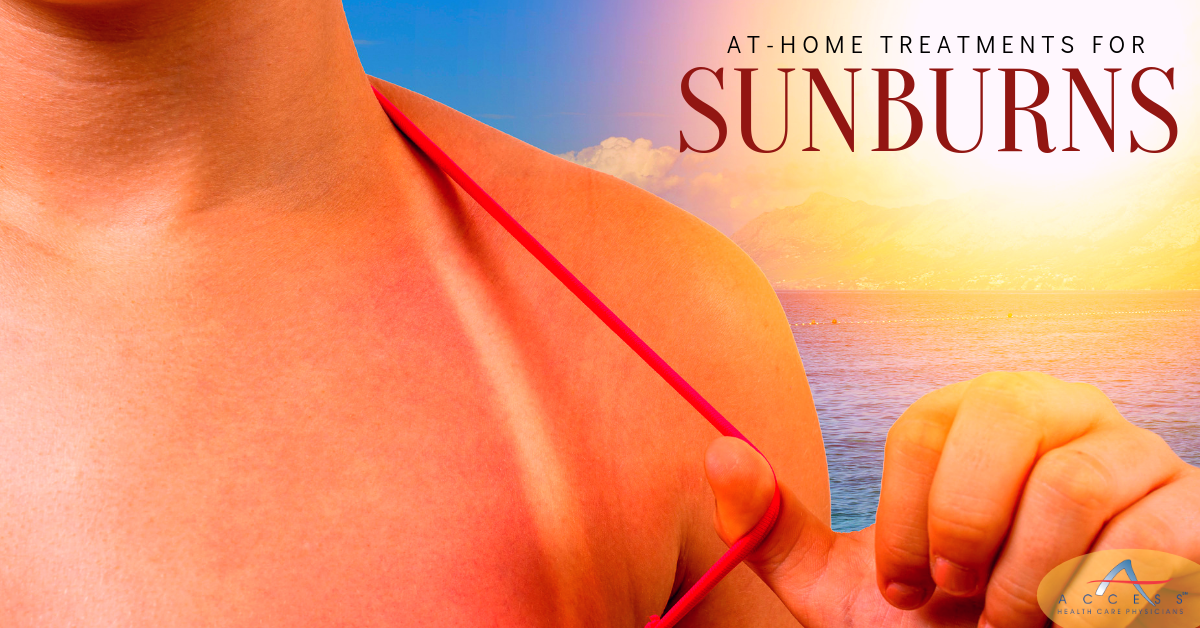Sunburn can occur in as little as 15 minutes, but the burn can continue to develop for 24-72 hours. According to a poll completed by the Skin Care Foundation, 42% of people report getting a sunburn every year. This means that many of us are likely to experience this painful condition at some point in our lives. Of course, the best method is to avoid a sunburn altogether. However, sometimes a sunburn may occur and knowing the best treatments can come in handy in the event of this painful skin condition.
Keep in mind that just 5 sunburns in a lifetime can increase your risk of developing melanoma by up to 80%. And while the symptoms of a sunburn are temporary, the damage to your skin and DNA is permanent.
At-Home Treatments for Sunburn
Here are a few at-home treatments that can help to relieve the symptoms of a sunburn and aid in the healing process:
Pain Relief – Pain is typically the worst 6-48 hours after exposure. Using over-the-counter pain medications, such as ibuprofen, may help to reduce swelling and pain.
Rehydrate – This is one of the most vital steps to recovery. Sunburn can lead to overall dehydration as fluids are pulled to the surface of the skin to aid in healing. Drink plenty of water and remain hydrated. Also, be sure to eat a balanced diet to ensure the skin is getting a full range of nutrients.
Cool the Skin – Try taking a cool shower or bath to cool down the burn. Afterward, try using cool washcloths placed on the skin to help keep the skin cool.
Don’t Break Blisters – It is possible to develop small blisters as a result of a sunburn. Allow them to heal on their own without popping them intentionally. Popping these blisters may slow the healing process and create an increased risk of infection. If you notice one break, be sure to clean the area with mild soap and water.
Apply Moisturizer – While there are many commercial products on the market for soothing sunburned skin, mild scent-free lotion and fresh 100% aloe gel are typically the most recommended. A great tip: store your aloe or moisturizers in the refrigerator for an extra cooling effect. Do not apply butter or petroleum jelly. These are false remedies and can actually clog the skin, trapping heat and prevent healing. Also be sure to check your lotion’s ingredients to avoid petroleum as well as benzocaine and lidocaine, which can irritate the skin.
Do Not Peel the Skin – If your skin begins to peel, typically 3-8 days after exposure, do not force or peel the skin off. Continue to keep the skin hydrated with moisturizers and drink plenty of fluids. Peeling skin may not look appealing, but it is your body’s way of slowly removing the dead skin. Peeling will typically stop once the skin is fully healed.
Avoid More Exposure – While this may seem obvious, stay out of the sun as much as possible during healing. Continued exposure to UV radiation will only worsen the symptoms.
When to Call a Doctor
It is important to note that while most sunburns can be treated at home, more severe cases may need medical attention. Call a doctor if any of the following symptoms occur with a sunburn:
- Fever
- Chills
- Nausea & Vomiting
- General weakness
- Extreme thirst or inability to urinate
- Confusion
- Signs of infection
- Blisters that cover large areas of the body
Sunburn Prevention
We would be remiss if we did not discuss sunburn prevention. It’s more than an annoying condition, as mentioned previously, sunburns cause lifetime damage to your skin cells and DNA. Here are a few quick tips for avoiding sunburn:
- Stay in the shade
- Wear protective clothing such as a wide-brimmed hat, clothing with built-in UV protection, called UPF
- Wear a broad-spectrum sunscreen with at least an SPF of 30
- Apply often – at least every 2 hours
- Apply enough – 1 ounce for the body and 1 tablespoon for your face
- Wear sunglasses with UV protection
- Don’t forget to protect commonly forgotten places such as your ears, lips, hairline, feet and hands
- Avoid going outdoors during the hottest & sunniest parts of the day
Avoiding a sunburn should always be the first line of defense for your health. However, in the event of a sunburn, keeping these remedies on hand will aid in a speedy recovery. Be sure to enjoy the outdoors in a safe way by following our tips on sunburn prevention.
Be sure to follow us on Facebook & Instagram for more great articles, fun facts and recipes!
Written by: S. Campbell for Access Health Care Physicians, LLC


